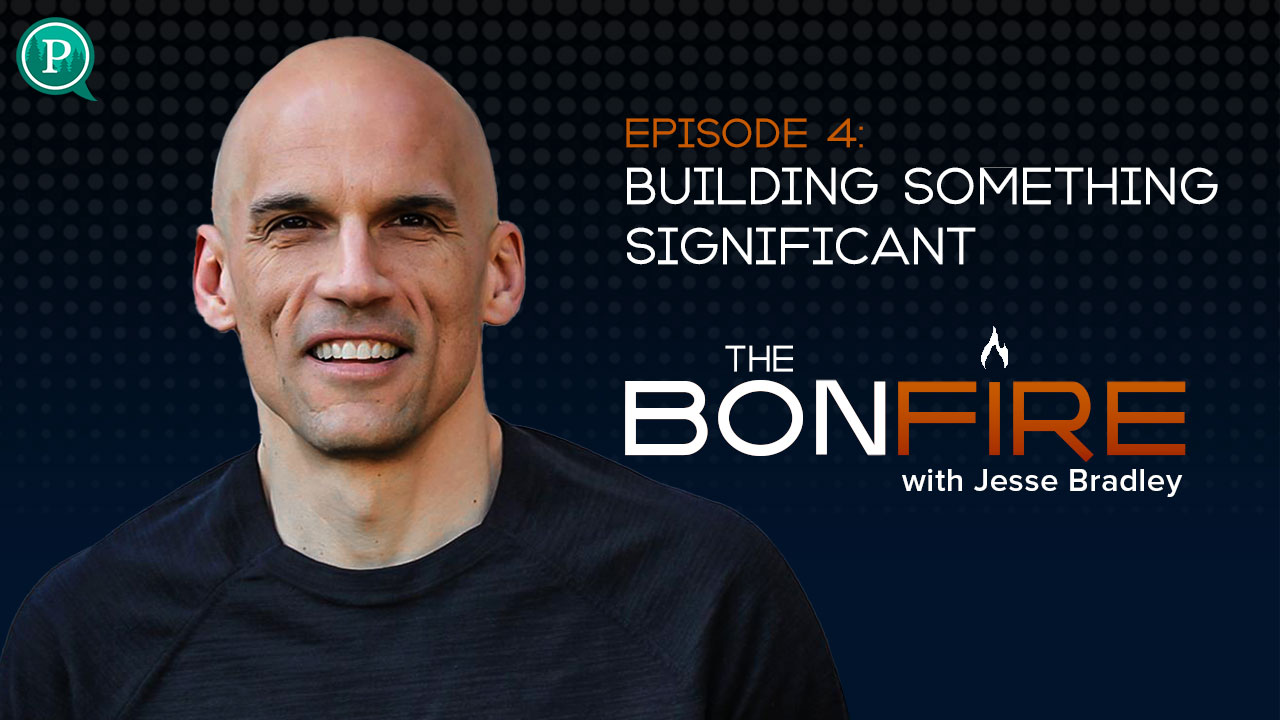Pastor Jesse Bradley discusses the importance of building something meaningful in life, drawing inspiration from the biblical story of Nehemiah. He outlines ten key elements to consider when embarking on a project: listening to God’s guidance, creating a clear plan, collaborating with others, making the vision compelling, empowering others, overcoming opposition, protecting the project, remembering God’s faithfulness, showing benevolence, and remaining faithful to God. Pastor Jesse emphasizes the importance of each step in the process, from listening to God’s guidance to remaining faithful to Him throughout the project.
If this resonates with you, please rate, review, and subscribe where you listen to podcasts. For updates follow me @jessejbradley on all socials and for the latest videos check out my YouTube channel Jesse Bradley. The best is yet to come!
Show Notes:
We are all building something
The story of Nehemiah
The context of exile and returning home to Jerusalem
- Listening to God
- A clear vision
- Collaboration
- Compelling communication
- Empowering people
- Overcoming opposition
- Protection
- Remembering God
- Benevolence and legacy
- Faithfulness to God
Special thanks to World Concern for sponsoring The Bonfire Podcast.
Transcription:
Welcome to “The Bonfire.” My name’s Jesse Bradley, and “The Bonfire” is a place about God’s presence, where we gather together, we grow, and most of all, we experience God’s presence, because there’s nothing greater in our lives. As we journey together, embers that sometimes can fade, we come together, and God stokes that fire in our lives. Today, we’re going to talk about how to build something well. We’re all builders, we’re designed to be builders. You might be building more than you even realize. There’s a lot of ways to build. You might be building small things, or extremely large things, but you can build momentum. You can build up people in your family. You might be encouraging and building up people with your words, and your actions. You’re even passing on what you know. You can build culture, you can build buildings, finances, initiatives, projects. You can build a ministry, you can build a business.
There are so many things to build, and building is wonderful because God builds, he creates, and we’re made in God’s image. He has given you talents, resources, time, treasure. There are so many things that God has given to you, and today, what I want to do is go through 10 different elements. When you’re building something, these are things to consider. It’s good to first take inventory, and identify, what are you building? What are you passionate about? Where are you investing your energy, and what do you want to see grow, and take off? There are a lot of causes, and it’s important to find a cause that resonates with you, and you wake up every day, you’re thinking about this. It’s exciting, it’s got your attention, it’s captivating. You’re building things. Again, it could be relational, or it could be something that you’re building with your hands, or your mind, but those three arenas, your mind, your hands, your relationships with your heart, all of it is designed to bring God glory, and benefit other people. Then, you’re going to come alive.
I want to say this: as you build something, God is going to build you. It’s not just about the end, but the process is very significant. It’s not just the outward, it’s the inward as well. It’s all connected. From heaven, it’s the process. It’s the end goal. Inwardly, your character, your skills, your learning, your development, and then also how other people are going to be blessed. God blesses you to bless other people, and the vision he gives you, and what you build, it’s never all about you.
Today, we’re going to focus on an inspiring story. At “The Bonfire,” we cover stories, we talk about stories, celebrate stories, and this is Nehemiah, who in the Bible, there’s a whole book on Nehemiah. You can read it after you listen to this. You might be motivated to go check out and read that entire book. There’s so much to learn. Here’s the context. In this particular case, the people are returning from exile. Yes, they were united as 12 tribes, but they rebelled against God, so 10 in the north, two in the south. Then, here comes the exile, because in the rebellion, Babylon comes, and God disciplines them as they’re taken to Babylon. God helps them return home. He opens up the doors, and as they return home, and they’re coming back to Jerusalem, the city is in ruins. There’s a lot of devastation, it’s discouraging.
If you’ve ever been part of something that was successful, and it’s not that way anymore, it hits you hard. If there’s been damage done, it could be a natural disaster, a hurricane or a fire, or it could be something that you built, and the business is no longer there, or the people have changed direction, and actually, they’re not following the plan anymore and they’re taking the whole thing down, there’s a lot of ways that it can go wrong. In this particular case, it’s a reminder that God invites us back to come home, to come home to him first, and then to rebuild. As Nehemiah and others return to their homeland, they can see there’s a lot of work to be done.
Now, here’s 10 elements, almost like a checkpoint. How’s it going with what you’re building? My hope is that by going through these 10, it’s going to add value. You’re going to gain some insights. God’s going to talk to you about how ultimately, the fire can grow, and what he wants to build. It can expand, it can accelerate, it can progress through you. Not only through you, but in you, God’s going to do some special things, so let’s get started.
Here’s the first one, and it’s listening. Nehemiah is a listener. A lot of people today aren’t good listeners. They don’t listen to other people, and they don’t listen to God. Nehemiah takes time before there’s any action. Now, he’s definitely a man of action, but he’s wise enough at this point to know he’s got to listen well. God communicates through his word, The Bible, and also through the Holy Spirit. If you want to listen, God reveals more. It’s important when you start to build, because unless the Lord builds, then those who labor are going to labor in vain. Moses said this to God, “If your presence doesn’t go with us, don’t even send us out from here.”
Nehemiah is making sure he’s listening to God. He’s in step with God, it aligns with heaven, and he takes some time. He takes some time to fast. Fasting is undervalued, and a lot of people just don’t fast, but when you fast, you’re giving God your attention. There’s a loss, because you don’t enjoy the same food and entertainment like you usually do, but there’s a closeness with God. When you’re fasting, you’re basically saying, “God, I’m hungry for you. I’m hungry for your wisdom. God, I’m available. What do you want to do in me?” As Nehemiah is fasting, he’s also grieving. That’s important at the start of the vision. When God has something for you to build, it’s going to be close to your heart, and it’s probably going to be that you’re not thrilled with the status quo. How things are right now is not how you want them to be, what they could be, what they should be.
It’s okay to grieve. That grieving and that pain might be part of the awakening that God wants to bring, and it might motivate you to roll up your sleeves and get busy. There are some things in this world where you’re going to grieve because you care a lot about it. You see pain. It could be from human trafficking, or people who don’t have clean water, kids that are literally starving, people who don’t have a Bible. You’re going to see divorce and abuse, and you’re going to see situations that tug on your heart. You’re going to see things in your neighborhood, your city, our country right now. It needs repair, places of devastation, and you’re going to step in, but first, listen to God. Grieve over what’s going wrong, and what is going wrong can create a holy restlessness where you’re like, “I want to be part of the solution. I want to make a difference.”
Nehemiah takes time to walk around the city. He takes a few days. Don’t rush the process. It’s not a microwave, you can’t just speed past it. Take that time to fast, to pray, to listen to God, and this is going upward. There’s an inner work that God wants to do before the outer work happens. When you think of Moses and what he built, he built this tabernacle, and he built things step by step, and The Bible says it’s just what God wanted. There’s a peace, and there’s a joy when you know that God approves, he’s cheering you on. He is like, “Yes, that’s the way to do it. That’s what I’ve called you to do. That’s what I want you to do.” That first part of listening is essential. Take some time, listen to God, maybe get away, out of your routine, where you normally stay. Take 24 hours, find a place where you’re alone.
Get pen and paper, write some things down. How is God stirring in you? What is the vision that he’s starting to bring? As you listen to God, that’s going to become clearer. God will turn up the light so you can see it clearer, you can hear it clearer, and then you’re going to step into it, because you know God’s called you. The first part is listening. Don’t rush that one.
The second part is really that plan, because when you get a vision, now what’s the strategy? What’s the plan? It’s important to have a plan. Leaders have plans. Teams have a playbook. If there’s no playbook, there’s no plan, everyone just does whatever they want to do. As Nehemiah is listening, there needs to be a plan. The vision and the strategy here for Nehemiah is to build a wall. A wall was so important in those days. It protected a city, it maintained, and the wall had been taken down. Without a wall, a city is defenseless. There’s a loss of hope without a wall. It was something very tangible. You might be building something tangible, or you might be building something intangible. Either way, you need a plan. You need clarity. Goals are important, next steps are important.
Nehemiah receives that vision from God. There’s a plan, there’s a strategy, there’s next steps. God’s not going to necessarily reveal everything. There’s going to be mid-course adjustments. I like to say plan in pencil, because we just don’t know everything until we get involved. You learn so much once you start doing. The best way to learn is to start doing. Yes, do your research, but when you get involved, it’s to experience, that’s when you’re going to grow.
Nehemiah has a plan. There’s a vision, and you might want to write it down. It might be helpful for you to write down, “Here’s the vision. This is why we’re doing it.” The why motivates other people. “Here’s our next steps, here’s our strategy. Here’s some of our goals. Here’s the finances.” Someone approached me this week, they’re planting a church, and they laid out the vision. I thought, “This is excellent. They’ve been listening to God for a while, and there’s a lot of clarity.” You need clarity with a plan.
Now, the third part is collaboration. You can’t do it alone. When God gives you a plan, there’s going to be other people who are getting involved, and as you look through the Bible, there’s some contemporaries to Nehemiah. There’s Ezra, and Ezra is one of those prophets, we all need an Ezra in our life. Ezra is not just going to say, “Yes, that sounds great” to everything. You have some people that, no matter what you do, they’re going to say, “That sounds wonderful. That’s awesome. Great, go for it.” That’s not Ezra. Ezra is someone who’s going to bring truth. Ezra is someone who’s going to bring what you need to hear, not what you want to hear. Ezra caress about people’s spiritual lives, not just that they’re doing the right thing, but how are they doing in their walk with God? Ezra goes deep, and Ezra is someone that’s going to help the nation return to God, and honor God, and walk with God. Again, make room for Ezras in your life.
In addition to Ezra, you have Zerubbabel. In the book Haggai, in The Bible, it’s a short book, Haggai is a prophet talking about rebuilding the temple. You have hearts returning home to God. Now, you have a temple that needs to be rebuilt, and as they rebuilt, it wasn’t as spectacular as the first temple, but like Haggai says, “The greater glory is a later glory.” Jesus Christ himself is going to be in this temple. It wasn’t the outside that mattered. It was what God was doing, and God’s plan, and God’s restoration. It’s important you don’t compare and envy the past. When God does something new or different, celebrate that, and move forward with God. This temple work that was done, same time. In Nehemiah, he’s building on the wall. He’s not going to do it alone. He needs a lot of leaders. He needs people who are going to step up. He needs people who are going to serve. It’s going to be a lot of collaboration.
When God calls you to do something great, collaboration and partnerships, that’s where you need to turn. You need to look around, and say, “Who shares my vision and passion? Who has complimentary skills?” Where you are weak, you’re going to need some people who are strong. Some people are strong in admin, some people are strong in tech, some people are strong behind the scenes, some strong in leadership, some strong in teaching. There’s a wide range of gifts, and that’s why we have the fullness of the body, and you need a team. It’s important when you’re in the room that you’re not the smartest one. You’re going to experts who understand things. They understand algorithms, they understand SEO, they understand hooks, they understand social media. There could be a lot of people you work with, they’re going to be experts, they’re going to know a lot more than you. Don’t be intimidated, don’t be insecure. That’s a really wise move, to have people in the room who are smarter than you in lots of different areas.
Collaboration, it’s when you come together, find people that their eyes light up when you share the vision. Their eyes don’t glaze over, but they burn. They’re like, “Could I please? I’ve already been thinking about this. I want to be a part of that.” As you share the vision, notice people’s reactions. You’re going to be excited, but pay attention to how they respond. If they don’t, that’s okay, bless them. Some of them are going to come in later, some of them going to come in much later. Some of them need to see it’s legit, and there’s momentum before they jump in. There’s going to be stages, but collaboration, look to see who you can lock arms with, and it’s going to go much further together. Collaboration, don’t try to do it all alone. You’re going to get burned out, you’re going to get discouraged. You won’t go as far. I know there’s a lot of independence in America, on the West coast, but you’ve got to come together.
That was Jesus’s longest prayer in the Bible, John 17, that we’d unite together. It’s an answer to prayer. Every time we unite, unity glorifies God, and we can serve each other as we serve in other people, and it’s just a lot of fun. I played sports. When you win championships, we won state championships, and Ivy League titles, and there was just a lot of winning by the grace of God, but what made it fun was not just getting the trophy at the end, it was the team, and the rides on the bus, and the relationships, the friendships. All that teamwork, that’s going to make it a joy as you build, and you’re just going to have memories and friendships that last far beyond the project as well.
Before we continue with today’s episode, I want to tell you about my friends at World Concern. The fact is, for generations, children and families have struggled to find clean water, food and a chance for a brighter future, and this includes the world’s poorest places. This can all change in this generation, and you can be a part of the transformation, including villages that are far beyond where the road ends. Visit worldconcern.org today, and find out how you can bring change and the love of Christ to children and families that are forgotten by most of the world. To learn more, and to get involved, go to worldconcern.org.
The next one is that, it’s compelling. This comes down to your communication. What’s the vision in a sentence? What’s the vision in 30 seconds? What about the two-minute vision? Do you have a trailer, or do you have a sizzle reel? Do you have video? Do you have pictures? Do you have a picture of the end goal? What are you going to bring that moves people? What are the soundbites, the phrases? What’s the story, stories? How has God built it up this far? What has worked and hasn’t worked? Be honest. What have you not done well? What do you need? What are the resources? Compelling, it’s got to move people. As you communicate, do it humbly, honestly, share your passion. Don’t be too contained, or just mundane, but share why you’re doing it. What’s important, opportunities to get involved? That communication, it needs to be a compelling vision.
Time is an incredibly valuable resource, and we’re all feeling like our plates are full. People don’t just usually have a lot of margin, and just looking for something. Whatever you bring, and whatever you’re building, it has to be such that when they hear it, they’re just going to think, “How would I not do that? Are you kidding me?” They would almost have a fear of missing out, in a good sense. They just want to be a part of this. They’re like, “Could I? You’re inviting me into this?” That’s the vision that you want to communicate. There are so many ways to communicate, and again, written and video are both important, because a lot of people are inspired by what they see, and a lot of people need to read, think it over, have it be well thought through when you present it. Leave someone with some information. It’s inspiration and information. It’s not just facts, it’s stories as well. Communicate both. Nehemiah does it incredibly well.
Here’s the next one, and this is number five, and this is empowering other people. When you read through the Book of Nehemiah, what you’re going to see is a lot of names. Why are there so many names? Well, the names are important because the people are important. When you have a project, thank other people. When you have success, name their names. Don’t just try to steal the spotlight. The great leaders don’t take all the credit. They give God glory, and they also are thanking people, and mentioning people who are doing work behind the scenes. The bad leaders, they take credit if it’s going well, and if it’s going bad, then they start pointing the finger at everybody. That’s not what Nehemiah does. He empowers people, and he gets them involved. He gives them a role, participation, and they own it.
People get involved when they shape it, and they own it. If you present everything, and it’s all completed, you’ve dotted every I, you’ve crossed every T, they’re going to be like, “You’ve got a slot for me? I get it.” They still might gladly serve, but if you can shape it together, you can get their input, you can learn, and whatever ideas they bring to the table, you start to incorporate those, because they’re involved, they’re going to own it. This is really strategic. Nehemiah places people next to where they live. They’ve got to build a huge wall. They’re not equally motivated for every part of the wall. That’s just human nature. Not everyone is going to be motivated by the same stuff, and you’re going to need to figure out, what are they really excited to do, and what’s the best place for them to get involved?
Nehemiah has them build a wall next to where they live. Why? Because that’s where they live. That’s their neighborhood, that’s where they know they need protection. They care about their neighbors, they care about their family. They want to see a solid wall right there. There are all these different locations, all these different people, and they’re not random. Nehemiah takes time to think through, what is the role that’s going to be best for this person? Bring out the best in other people, know their strengths, their weaknesses, what motivates them. I remember, when I played soccer, I was a goalkeeper, and I’d communicate to my teammates. I needed to know them well, not only what position and role, but also how to motivate them, because they have different personalities. Some of them would play their best when I would get on them a little bit, “You can do better, that guy’s running past you.”
As I would do that, they would step up to the challenge. They needed to be challenged. Other ones needed to be encouraged, or comforted a little more. “It’s all right, you’ve got the next one. Good job. Hey, you’re still playing well. Get your head up.” Whatever that looked like, some of them just had different personalities. How do you empower people so they own it, it brings out the best in them, and then you know them well enough to know what’s not going to help them, and what’s going to help them? Nehemiah does that incredibly well, and I believe that’s a catalyst, and an essential piece of the wall that they’re going to build. It’s those relationships. It’s not just what you build in terms of the wall. We talk about the wall all the time with Nehemiah, but look at the relationships.
If you don’t connect with people well, you’re not going to have a team, the wall’s probably not going to be built. Nehemiah knows what they need, and he’s there with them. He empowers them, but he is also in it with them. He’s not just from a distance telling them what to do, but he’s doing it. He’s working hard, and they’re doing it together. Together is the key. Again, empower other people. Actually give them a role. Actually give them leadership. Give them responsibility. Don’t try to hoard all of it, but let them spread their wings. Yes, you check in with them. Yes, you make sure they’re on the right track, but overall, they don’t feel like you’re micromanaging. They feel like they can go for it, and they are. They’ve got real responsibility. That’s important. What you give away is really important. Give it away, do that wisely. Make sure you’ve got the right people. Make sure they’re reliable, they’re faithful, they’re teachable. Make sure they’re dependable. There’s an old FAT, faithful, available and teachable. It’s empowering the right people in the right way.
Then we’ve got number six, which is overcoming, and there’s a lot of opposition in the book of Nehemiah. There are a couple of names that appear, Sanballat, Tobiah, and then Geshem. You’re always going to have people who throw shade, who try to slow you down, and here’s the tactics they used: intimidation, fear, bullying, discouragement. “This wall will never be any good. It’s going to topple over.” They get government involved, military threats. They try to get authority to stop them, every single tactic, including distraction. At one point, Nehemiah has to say, “No, I’m not going to come down from this wall to talk to you anymore. God’s doing a great work, and I’m not going to step away from it.”
It’s important that you set limits. There are some pointless conversations. There are some unnecessary conflict and battles. There’s people who are making requests of your time, and if you say yes to everybody, you’re not going to build the wall. You’re not going to finish the project. It’s going to get slow, it’s going to get frustrating, you’re going to get drained. You need to know what God’s called you to do, and then have a lot of limits, and say no to people. Be very intentional about what you’re investing in, and when opposition comes, first, don’t give them too much power. Don’t let their voice take over. The real estate between your ears is too valuable. Don’t keep replaying the tapes of their comments. Don’t go down the road of worry, and worst case scenario.
Listen, you’ve got a lot of people who are going to build you up. Spend time with the right people who bring out the best in you, and when the opposition comes, you’ve got to stand in truth, trust God. Perfect love drives out fear. You go back to the Lord, you go back to his word, you go back to his promises, and then you remember that God is faithful. There’s also a devil who’s real. His native language is lying, and he wants to steal, kill, and destroy. How do you overcome the lies? You walk in truth. Jesus is the truth. Walk with Jesus, abide with him. There’s going to be people who try to undermine you. They mistreat you, they slander you, they try to put down your projects, they misunderstand you. They might do it intentionally, unintentionally, and they get a lot of people against you. That’s going to be part of the project. Whenever you’re building something wonderful, it’s just a target for more people to try to throw negativity towards you.
The next one is protection, it’s a response to overcoming. Nehemiah places people on the wall to protect. He’s building, he’s also protecting. What you value the most, you protect. You’re going to need to be intentional. He physically needed protection. There’s spiritual protection. Get a prayer team, build up your prayer life. There are lots of ways to protect, but this is too valuable to let the opponents come and just take it down, so protect it.
The next one is remembering, this is number eight. Nehemiah will tell people, remember God. In their hardest days, remember what God has done. Make a list of what he’s done in your life, so you’ll stay encouraged. Remember who God is right now, and remember his promise. He who began a good work is faithful to complete it. As you remember God, you’re going to find strength again, because you’ll draw near to God. When the people started to feel like, “I don’t know if this is going to work,” and you’re going to have those moments. “This feels a little crazy. This feels like it’s too much. I don’t know if it’s going to work.” They remember God, and as they return to God and remember God, they remember the vision, and the calling, and the plan. All of that flows from remembering God. Nehemiah is a great leader because he keeps helping people to remember God.
The ninth one is benevolence. This is important, that your project makes a difference not only right now, but for future generations. In your parenting and building up kids, you’re going to bless future generations. When you have projects that you’re building, don’t just think about right now, this month or this year, but what about three years, five years from now? How is it sustainable? How is it going to multiply? How do you scale it? How do you involve other people? Have that be part of the vision, because you want to see long-term. In our church, I’m so grateful, we’ve been 70 years. What we’ve seen is that each generation is thinking about the next generation. We were able to knock out $2.3 million of debt. It blesses the next generation. COVID came and shut down the building briefly, and then restrictions, but God rebuilt it. There were a lot of people serving different cultures, different generations, and there was an intentionality to it.
Now, we see the youngest generation just thriving like never before. The media ministry that just took off after COVID, we were able to reach 480,000 decisions, for people to follow Jesus. It’s just blessing people in the next generation, other nations. God sometimes will give you a vision bigger than you anticipate, and sometimes it’ll be very small. It’s okay either way. Mother Teresa said, “Not all of us do massive things, but we can all do small things with great love.” As you do it with great love, there are no limits to what God can do. The benevolence, the love, check your heart, that it’s compassion, and that you care about other people. It’s not just one place, but look what God can do with many generations, many nations, and again, trust the Lord.
If your heart is right with benevolence, God is going to use you to bless other people beyond what you can see or imagine. Sometimes, this side of heaven, you only get a glimpse. It’ll be beyond that when you really get to see the fullness.
The last one I want to say is faithfulness to God. When it’s all said and done, at the end of your life, the North Star is faithfulness to God. Let that be the checkpoint. Are we being faithful to God? Make sure it’s God’s timing, God’s way, and ultimately, it’ll be God’s results. Be faithful, and trust him with the results. Faithfulness to God, you’ll never get something better or deeper than that. At the end of our days, nothing will be more rewarding than to be able to say, “We were faithful to God.”
This is “The Bonfire.” I hope those 10 elements are important, helpful for you, practical as you think through, what is God doing in your life right now, and what are you building? You can read through the book of Nehemiah, or you can go back and listen to this again. Share it with a friend who you’re serving with, and think through the vision. Think through what’s missing. Where are we strong? Where do we need to grow? Keep building in God’s strength, reliance on God is essential as you build. You don’t have all the answers? It’s okay. God will give you wisdom. You don’t have all the strength? It’s okay. In your weakness, God’s power will be made evident. You don’t have all the people? It’s all right, God’s going to provide. Where he gives the vision, he gives the provision. Our God is good, and you can trust him in the process. Remember, it’s not only what you’re building, but how God is building you.
This is “The Bonfire.” We come together in God’s presence. We gather together, we grow, and God does amazing work in you and through you. It’s God’s fire, it’s God’s spirit, it’s God’s power, we give him the glory. It would mean so much if you could like, subscribe, if you could comment, rate this podcast, share it with friends. God is building something, and we want to keep growing together. I’d love to hear from you, how God is using this podcast in your life, and share your story. Around the bonfire, we love to share stories. We’d love to hear from you, so please connect, thebonfire.org, and let’s keep growing in our faith together.
Follow this podcast:








